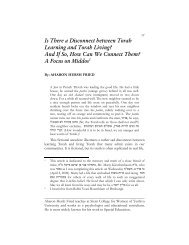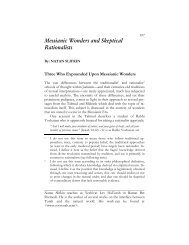Avraham and Sarah in Provence - Hakirah
Avraham and Sarah in Provence - Hakirah
Avraham and Sarah in Provence - Hakirah
You also want an ePaper? Increase the reach of your titles
YUMPU automatically turns print PDFs into web optimized ePapers that Google loves.
246 : Ḥakirah, the Flatbush Journal of Jewish Law <strong>and</strong> Thought<br />
needed. 96 That said, should such books as Encounter<strong>in</strong>g the Creator be<br />
banned? I th<strong>in</strong>k not. Were one to promote a ban on the use of the<br />
chomer/tzurah metaphor <strong>in</strong> the <strong>in</strong>terpretation of Tanach, many a classic<br />
sefer would have to be pulled from the shelves of our sefarim stores as<br />
well.<br />
“And he said to <strong>Sarah</strong> his wife” 97—there are two shades <strong>in</strong> the<br />
worship of the tzaddik. One is to serve with ruchniyus (spirituality),<br />
<strong>and</strong> the other is to also sanctify <strong>and</strong> purify one’s gashmiyus (physical<br />
be<strong>in</strong>g) excessively. The quality of worshipp<strong>in</strong>g with ruchniyus is<br />
called <strong>Avraham</strong> <strong>and</strong> this is from the male ( ארכוד)<br />
side, while that<br />
of worshipp<strong>in</strong>g from the gashmiyus is called <strong>Sarah</strong>. Thus the mean-<br />
<strong>in</strong>g of “He said to <strong>Sarah</strong> his wife” address<strong>in</strong>g the female ( אבקונ)<br />
side <strong>and</strong> tell<strong>in</strong>g her “that now I know you are a beautiful woman,”<br />
is that I have not ascended to the highest level of sanctity, for I still<br />
am drawn by physical beauty. “And they will kill me” means that if<br />
we do not check ourselves <strong>and</strong> strengthen our sanctity, then, G-d<br />
forbid, they will kill me, i.e., the ruchniyus force. “And you they will<br />
let live” means that the force of gashmiyus will have ascendancy.<br />
Therefore say “you are my sister” mean<strong>in</strong>g that we should<br />
strengthen ourselves <strong>in</strong>tensely <strong>in</strong> sanctity <strong>and</strong> <strong>in</strong> cl<strong>in</strong>g<strong>in</strong>g to the Torah<br />
consistent with the verse “say to wisdom that you are my sister.”<br />
98 “That it may be good for me,” means that because of this I<br />
shall ascend to the goodness of the highest sanctity for the force of<br />
ruchniyus will be dom<strong>in</strong>ant… And also this “my soul will live for<br />
your sake ( ךללגב)<br />
”—the term ךללגב is related to “as the dung<br />
( ללגה)<br />
is swept away” referr<strong>in</strong>g to the fact that the life-force of<br />
sanctity would be <strong>in</strong>jected even <strong>in</strong>to the dung, i.e., the gashmiyus.<br />
(Noam Elimelech, parashas Lech Lecha)<br />
Rav Elimelech of Lizhensk not only equates female <strong>and</strong> male<br />
with chomer <strong>and</strong> tzurah, albeit with the term<strong>in</strong>ology of gashmiyus <strong>and</strong><br />
96 תורוד ורמאי המ . ןונבלה יזראכ םיקזח ויה םהש ףא לע םינושארל ץוחנ היה רפסה םאש<br />
זאמ רפסה תא סיפדחל ךירצ היהש ו"<br />
ק לש ונב ןב ו"<br />
ק...<br />
לתוכה יבשעכ םהש םינורחאה<br />
לארשי תוצופת לכב וציפהלו םדקמו.<br />
97 These verses are from Bereishis 12.<br />
98 ( ד:<br />
ז ילשמ)<br />
ְתּאָ יִת ֹחֲא<br />
, הָמְכָחַל רֹמֱא<br />
. This verse us<strong>in</strong>g the fem<strong>in</strong><strong>in</strong>e “sister” for<br />
wisdom would seem to pose a challenge to our analysis, but look<strong>in</strong>g at<br />
the follow<strong>in</strong>g verses “to guard you from the foreign woman,” it becomes<br />
clear that it means to say that the fem<strong>in</strong><strong>in</strong>e side, i.e., chomer, must<br />
be imbued with wisdom.
















